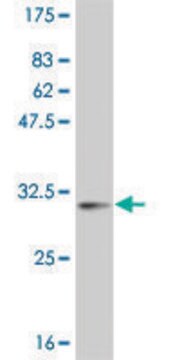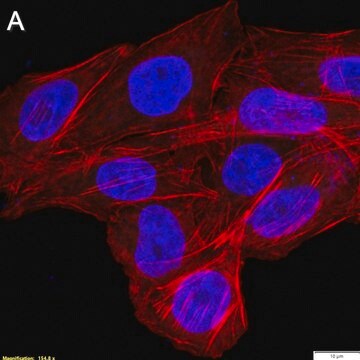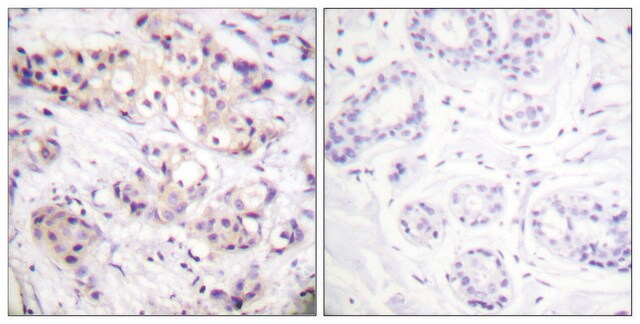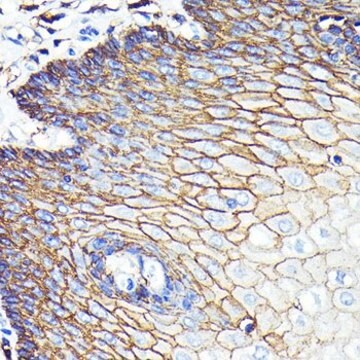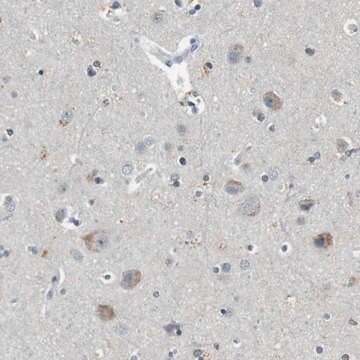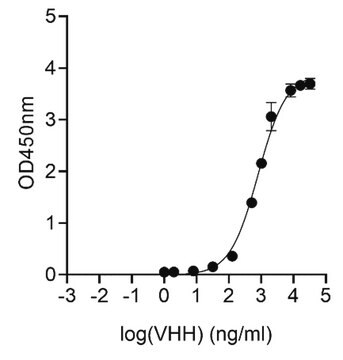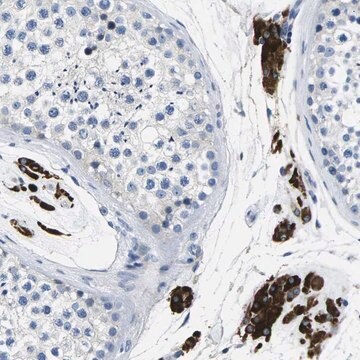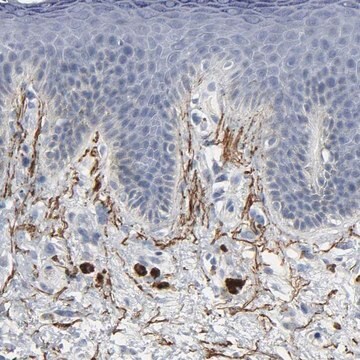推荐产品
生物源
rabbit
品質等級
共軛
unconjugated
抗體表格
affinity isolated antibody
抗體產品種類
primary antibodies
無性繁殖
polyclonal
產品線
Prestige Antibodies® Powered by Atlas Antibodies
形狀
buffered aqueous glycerol solution
物種活性
rat, human, mouse
技術
immunoblotting: 0.04-0.4 μg/mL
immunofluorescence: 0.25-2 μg/mL
immunohistochemistry: 1:20-1:50
免疫原序列
ATLMMLGRFREALGDAQQSVRLDDSFVRGHLREGKCHLSLGNAMAACRSFQRALELDHKNAQAQQEFKNANAVME
UniProt登錄號
運輸包裝
wet ice
儲存溫度
−20°C
目標翻譯後修改
unmodified
基因資訊
human ... DNAJC7(7266)
一般說明
DNAJC7 (DnaJ heat shock protein family (Hsp40) member C7) protein has two chaperone-binding TPR (tetratrico peptide repeat region) domains and a DnaJ homologous J domain. It is a cytosolic protein. The gene is mapped to human chromosome 17q21.
免疫原
DnaJ homolog subfamily C member 7 recombinant protein epitope signature tag (PrEST)
應用
All Prestige Antibodies Powered by Atlas Antibodies are developed and validated by the Human Protein Atlas (HPA) project and as a result, are supported by the most extensive characterization in the industry.
The Human Protein Atlas project can be subdivided into three efforts: Human Tissue Atlas, Cancer Atlas, and Human Cell Atlas. The antibodies that have been generated in support of the Tissue and Cancer Atlas projects have been tested by immunohistochemistry against hundreds of normal and disease tissues and through the recent efforts of the Human Cell Atlas project, many have been characterized by immunofluorescence to map the human proteome not only at the tissue level but now at the subcellular level. These images and the collection of this vast data set can be viewed on the Human Protein Atlas (HPA) site by clicking on the Image Gallery link. We also provide Prestige Antibodies® protocols and other useful information.
The Human Protein Atlas project can be subdivided into three efforts: Human Tissue Atlas, Cancer Atlas, and Human Cell Atlas. The antibodies that have been generated in support of the Tissue and Cancer Atlas projects have been tested by immunohistochemistry against hundreds of normal and disease tissues and through the recent efforts of the Human Cell Atlas project, many have been characterized by immunofluorescence to map the human proteome not only at the tissue level but now at the subcellular level. These images and the collection of this vast data set can be viewed on the Human Protein Atlas (HPA) site by clicking on the Image Gallery link. We also provide Prestige Antibodies® protocols and other useful information.
生化/生理作用
DNAJC7 (DnaJ heat shock protein family (Hsp40) member C7) is a co-chaperone, which is involved in steroid receptor chaperoning. It controls HSP (heat shock protein)-70/HSP90 chaperone system. Additionally, it promotes the stability of p53 by inhibiting the association between p53 and MDM2 (E3 ubiquitin protein ligase).
特點和優勢
Prestige Antibodies® are highly characterized and extensively validated antibodies with the added benefit of all available characterization data for each target being accessible via the Human Protein Atlas portal linked just below the product name at the top of this page. The uniqueness and low cross-reactivity of the Prestige Antibodies® to other proteins are due to a thorough selection of antigen regions, affinity purification, and stringent selection. Prestige antigen controls are available for every corresponding Prestige Antibody and can be found in the linkage section.
Every Prestige Antibody is tested in the following ways:
Every Prestige Antibody is tested in the following ways:
- IHC tissue array of 44 normal human tissues and 20 of the most common cancer type tissues.
- Protein array of 364 human recombinant protein fragments.
聯結
Corresponding Antigen APREST75784
外觀
Solution in phosphate-buffered saline, pH 7.2, containing 40% glycerol and 0.02% sodium azide
法律資訊
Prestige Antibodies is a registered trademark of Merck KGaA, Darmstadt, Germany
未找到合适的产品?
试试我们的产品选型工具.
儲存類別代碼
10 - Combustible liquids
水污染物質分類(WGK)
WGK 1
閃點(°F)
Not applicable
閃點(°C)
Not applicable
Natsumi Kubo et al.
Biochemical and biophysical research communications, 430(3), 1034-1039 (2012-12-25)
Tumor suppressor p53 plays a critical role in the regulation of DNA damage response. Upon severe DNA damage, p53 promotes apoptosis to eliminate cells with seriously damaged DNA to maintain genomic integrity. Pro-apoptotic function of p53 is tightly linked to
Nela S Cintrón Moffatt et al.
Biochemistry, 47(31), 8203-8213 (2008-07-16)
The molecular chaperones Hsp90 and Hsp70 are highly regulated by various cochaperones that participate in the activation of steroid receptors. Here we study Tpr2 (also called DjC7), a TPR domain-containing type III J protein implicated in steroid receptor chaperoning. We
Alexander Brychzy et al.
The EMBO journal, 22(14), 3613-3623 (2003-07-11)
In the eukaryotic cytosol, Hsp70 and Hsp90 cooperate with various co-chaperone proteins in the folding of a growing set of substrates, including the glucocorticoid receptor (GR). Here, we analyse the function of the co-chaperone Tpr2, which contains two chaperone-binding TPR
Musaffe Tuna et al.
Molecular cancer, 14, 29-29 (2015-02-04)
Acquired uniparental disomy (aUPD) can lead to homozygosity for tumor suppressor genes or oncogenes. Our purpose is to determine the frequency and profile aUPD regions in serous ovarian cancer (SOC) and investigated the association of aUPD with clinical features and
Yoav E Timsit et al.
PloS one, 9(5), e96092-e96092 (2014-05-03)
The constitutive active/androstane receptor (CAR) plays an important role as a coordinate transcription factor in the regulation of various hepatic metabolic pathways for chemicals such as drugs, glucose, fatty acids, bilirubin, and bile acids. Currently, it is known that in
我们的科学家团队拥有各种研究领域经验,包括生命科学、材料科学、化学合成、色谱、分析及许多其他领域.
联系技术服务部门